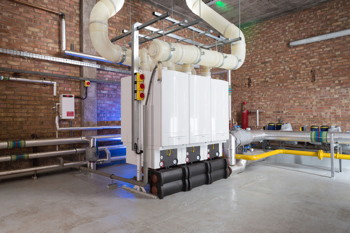Find your balance

Boilers are more efficient than ever, but there are simple enhancements which can deliver extra gains for smart users. Pete Mills explains how system rebalancing and weather compensation can be used to deliver exponential efficiency gains, even on older systems.
It is often said that a heating and hot water system is ‘out of sight, out of mind’, but given the energy used to heat a large commercial or multi-residential building, a heating system will eventually draw attention from the building owners and users.
One of the main reasons is that heating is likely to be one of the building owner’s greatest expenses, and many will find themselves looking for ways to tweak the system to ensure it continues to operate as efficiently and effectively as possible.
Fortunately, there are solutions out there which are very much suitable for retrofit scenarios – meaning that a system originally sized for usage patterns 20 years ago can still be optimised for the slightly different patterns we see today.
Out with the old…
One of the issues with older systems is that they were typically designed to operate at a flow temperature of 82°C and a return temperature of 71°C, with the radiators then sized accordingly. If we go back as far as the 1970’s, the technology used to calculate heat losses and radiator sizes was nowhere near as accurate as it is today. This, combined with what can often be a conservative approach from system design consultants, meant that radiators were often deliberately oversized on the principle of ‘just in case’.
The issue with these return temperatures is that they are simply too high. For a boiler to condense, the return temperature of the water must be 55°C or below, which in turn will allow it to operate at its most efficient.
So how do we ensure the boiler can condense as much as possible during a typical annual heating pattern?
One of the best ways to boost the efficiency of a heating and hot water system is to harness the benefits of system rebalancing and weather compensation.
There is a lot of information available which explains the benefits of rebalancing older systems previously operating at 82/71°C (flow/return) to temperatures of 80/60°C. While the process does involve some work, with the contractor generally having to physically rebalance each radiator, technology such as differential thermometers can make that process a lot more straightforward than many are likely to assume.

When a heating system is rebalanced in such a way, the radiators will, quite naturally, not emit as much heat as they did previously. That said however, they may not need to, given that the vast majority of radiators in UK buildings are said to be oversized. This means there is huge potential for boiler temperatures to be safely rebalanced to 80/60°C and still have sufficient heat output from the radiators. While this is in part made possible because of the aforementioned oversizing issue, it has also been further helped somewhat by improvements to insulation standards and the typical fabrics we use to construct modern buildings.
Erring on the side of caution and staying loyal to the more familiar, higher temperatures can seem appealing, but this way of thinking equates to money being wasted. To this end, rebalancing the system can pay real dividends.
Don’t blame it on the weather
The ability to rebalance a system to 80/60°C gets us much closer to the temperatures required for the boiler to condense, but the real incremental benefits start to come to the fore when we introduce weather compensation, which adjusts the flow temperature day-to-day in line with the outside temperature. The knock-on effect of this is significant periods of the year where the return temperatures are also considerably lower, allowing the boiler to condense. Popular across much of mainland Europe, weather compensation controls offer quick payback on a relatively small initial investment.
There are some misconceptions in the marketplace which suggest that condensing boilers are not very well suited to older systems, but plenty of evidence exists to prove that they can work perfectly well while achieving major efficiency gains.
Unfortunately for many, upgrades tend to happen in a distress scenario, where urgent action is needed in order to get the heating back up and running after a fault or breakdown. This can leave contractors with very little time or inclination to fine-tune the system and optimise its efficiency through rebalancing, for example. That said, taking that little extra time at the point of any servicing or maintenance work, could soon pay for itself in the performance enhancements created as a result.
Put simply, those who invest the most effort to rebalance their systems and upgrade them with more intuitive technology such as weather compensation stand to reap the greatest rewards.
Pete Mills is commercial technical operations manager at Bosch Commercial and Industrial







